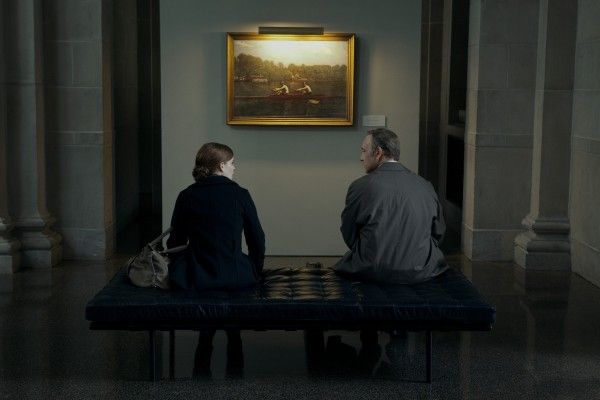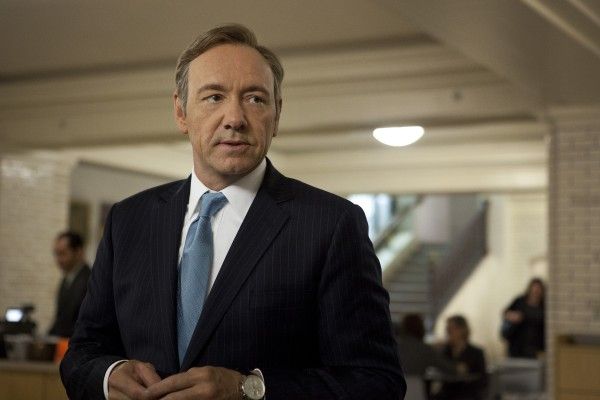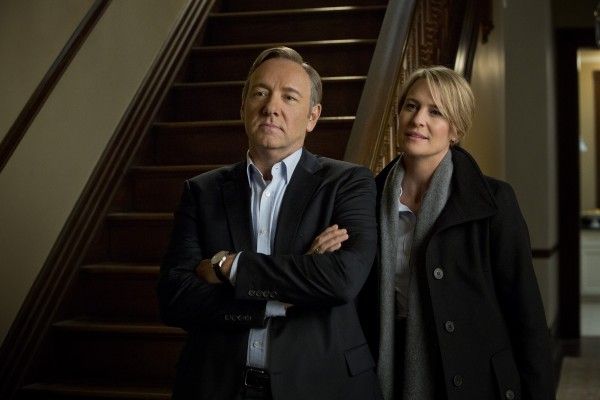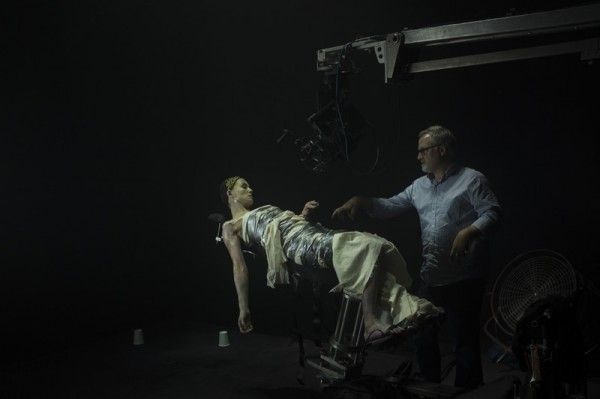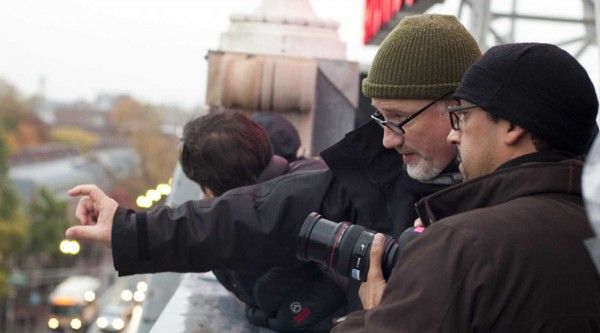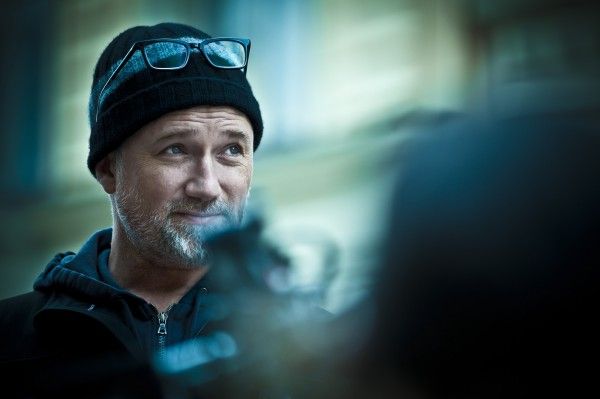[With the upcoming release of his new film Gone Girl, I’m taking a look back at the work of director David Fincher. These articles contain spoilers.]
"I want to see everybody as unhappy as me," Fincher says jokingly in the making of documentary for The Curious Case of Benjamin Button. For most of his filmography, Fincher has given us cynicism we can understand but as a way of peeking behind the corner to show us some darkness. Cynicism perseveres because it's surrounded by what's seemingly positive. With House of Cards, Fincher held our hands and we jumped into a world we already knew was wretched, awful, and rotten: Washington politics. The challenge wasn't to make audiences detest politicians; the challenge was making it so damned delectable.
Fincher never stopped making commercials or music videos even when his career as a filmmaker took off. He moved to television with House of Cards but in the 21st century model created by Netflix, and only as something he helped launch as Beau Willimon worked as showrunner. So other than all being as unhappy as him, what does the future hold for David Fincher?
Throughout this series, I've identified characters who have a kinship with Fincher. Frank Underwood (Kevin Spacey) is no different. Fincher says on the commentary track that everyone in the cast was their first choice, and with Frank, it's hard to imagine any other choice. Aside from the fact that Spacey already played a sociopath for Fincher once, a power-mad politician wasn't too much of a stretch. And if you believe I'm exaggerating when it comes to pointing out a kinship between the director and his characters, then I'd like you to recall my Alien 3 article where I noted that Fincher said on set, "I love people; they stack so well." That same line comes out of Frank's lips in the beginning of episode two.
Along with developing House of Cards, Fincher directed the first two episodes of the series, and it plays like a movie. Chapter Two immediately picks up where Chapter One ended, and from there we have an interesting balance of Fincher setting up a story he won't personally finish. And yet even though he's not personally overseeing each episode—which is a big deal considering his meticulous attention to detail on his movies—the series must adhere to his initial direction in terms of the tone. The variations come on just how far House of Cards is willing to go when it comes to its protagonists' motivations.
The show is perversely comforting. I've oft compared it to an evil version of The West Wing, a series where smart characters come together to do good deeds. In House of Cards, smart characters come together for the sole sake of obtaining amoral power. Either way, these shows uphold the notion that there are smart people in Washington, D.C. who can actually do something. The West Wing is a fairy tale, and House of Cards is a dark fantasy with Frank Underwood as its overlord.
It's such a vicious piece of work, and yet oddly reassuring. Frank is the devil we know, and the devil has a sure hand even if we're not sure what he's ultimately going for. Frank loves to muse about power, and we see that it's a goal in and of itself. He doesn't have a target for a nuclear weapon. He just likes having the nuclear weapon and knowing he could destroy anyone if he wanted to.
The show has a mean streak a mile long, and yet its dark, pulsating heart does have some semblance of love. In an excellent editorial for The Dissolve, Matt Singer pointed out that a common theme in David Fincher's movies is the ephemeral, fleeting nature of love and relationships. But House of Cards has Frank and Claire (Robin Wright) as it's "power couple", and their relationship is unlike anything else on television. They're made for each other, and they're made to own the world at any cost.
Wherever House of Cards goes for season three, Fincher will be off doing other projects, and so like Alien 3, it's difficult to evaluate his overall influence. Fincher was an easy choice for this project because he's so hands-on with every aspect of a production. Even with House of Cards he admits that the speed of television changed his approach:
“On a movie, I would have worried more about what was on the countertops and how many things would be inside the cupboards when they opened and how many plates they would have, and in television you just go, ‘Oh, that’s what it looks like in there? Okay, fine.’” I would have repainted it; made it dirtier.”
Fincher's influence on House of Cards is unmistakable in terms of its tenor and attitude, but it left his serious oversight years ago. Furthermore, television is a writer's medium, not a filmmaker's, although that paradigm is quickly shifting.
As we reported earlier this week, plans to direct the entire first season of the upcoming HBO series, Utopia. The story centers on a group of die-hard fans of an underground graphic novel who learn that the author has secretly written a sequel, launching them into their own pop-culture thriller. They find that “the new manuscript is much more than just a book, and those on the hunt for it suddenly find themselves in a game of shifting loyalties, conspiracy and shocking twists as the true meaning of the book is slowly revealed.”
It will be fascinating to see how different a show can be when Fincher directs all the episodes (at least of the first season) as opposed to only the first two. We're in the Golden Age of Television, and Fincher is clearly sharp enough to know that this is a place he wants to be, at least for the time being. It also helps that his close friend Steven Soderbergh has had such a positive experience with his TV series, The Knick. While I'm excited for Utopia, the flipside is we don't know when we'll back to movies since he'll be spending all of 2015 working on the TV series.
And I'm not sure he'll come rushing back for a movie. He tried for a long time to get his adaptation of 20,000 Leagues Under the Sea up and running, but it was scuttled by the studio system:
“You get over $200 million… all motion picture companies have corporate culture and corporate anxieties. Once we got past the list of people we could cast as the different characters in the film, once we got past one or two names which made them very comfortable, making a movie at that price, it became this bizarre endeavor to find which three names you could rub together to make platinum… I just wanted to make sure I had the skill-sets I could turn the movie over to. Not worrying about whether they’re big in Japan.”
Having looked over Fincher's body of work, the prospect of him handling a $200 million film is beyond enticing, and yet I'm in no way surprised that the studio system forbade him from making it on his terms. And even if it's something with a smaller price tag, for example, Jobs, Fincher won't do it unless it can be his way.
His films have a style and personality, but it never feels like he's repeating himself. His best films provide a variety of different angles, and even his weaker efforts can elicit an emotional or intellectual response. Fincher's exacting effort on his films carries over to his audience to where we're aware of the artistry, but it never feels like showing off. Witnessing his artistry and development over the course of his career made this retrospective a tremendous experience.
I deeply hope you have enjoyed reading this retrospective series on David Fincher, and I will give him the last word on where his career has led [via The Guardian]:
“I find that people are more willing now to accept my proclivities,” he says, as the waitress clears the table. “I don’t have as many conversations with financiers about, ‘Don’t worry, it’s gonna be funny.’ Now people are more apt to just go, ‘It’s gonna be what it’s gonna be. Don’t ask.’”
Tomorrow: My review of Gone Girl
Other Entries:
- The Work of David Fincher
- Alien 3
- Se7en
- The Game
- Fight Club
- Panic Room
- Zodiac
- The Curious Case of Benjamin Button
- The Social Network
- The Girl with the Dragon Tattoo


